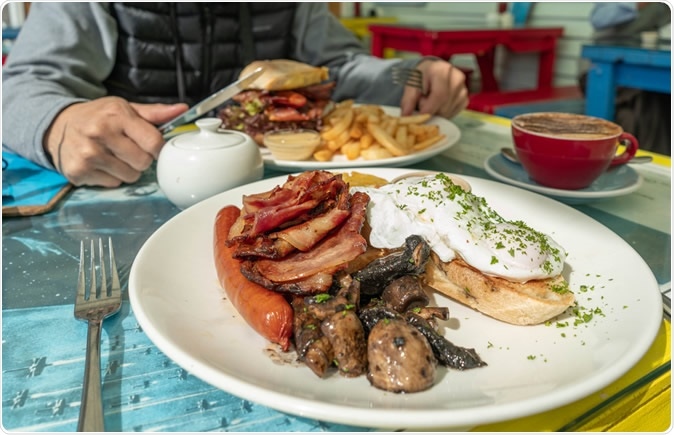There has been some debate on whether or not to pile up on calories at the first meal of the day. According to German researchers, to lose weight, one must eat a healthy and hearty breakfast.
The new study titled, “Twice as High Diet-Induced Thermogenesis After Breakfast vs Dinner On High-Calorie as Well as Low-Calorie Meals,” is published in the latest issue of the Journal of Clinical Endocrinology & Metabolism.
Lead researcher Dr. Juliane Richter, a neurobiologist at Lubeck University in Germany, assured that those who have a substantial breakfast are more likely to burn up to two and a half times more calories than those who skip breakfast. Thus, heavy breakfast eaters stand a better chance at losing weight she added. The answer could lie in the diurnal differences in metabolism, the researchers explain. They worked on diet-induced thermogenesis (DIT) or heat energy that is produced from the food eaten.

Extensive breakfasting should be preferred over large dinner meals to prevent obesity and high blood glucose peaks even under conditions of a hypocaloric diet. Image Credit: KungCrayfish / Shutterstock
What's the study about?
The researchers attempted to find if there was any variation in the thermogenesis throughout the day and how it could assist in losing weight. The authors wrote that most obese individuals with type 2 diabetes tend to count calories and try to lose body weight by reducing the calories taken at breakfast or skipping breakfast altogether. This strategy they wrote is “controversial” because it reduces the calorie intake in the first half of the day but most individuals compensate this towards the end of the day. This ultimately means that the target weight loss is not achieved.
For this study, the team included 16 men aged an average of 23 years and having normal body weights. These men underwent lab-based research for three days. They were divided into two groups. The interventions in their diets were then switched over to the other group – this was a cross over study. Participants did not have a family history of type 2 diabetes, did not smoke or drink or use other substances of abuse, were not shift workers (which alters the circadian rhythms), were not athletes or under physical or mental strain.
The first group was given a low-calorie breakfast, which was defined as 11 percent of the individual daily calorie requirement. They were then given a high-calorie dinner with 69 percent of the daily calorie requirement in that meal. The other group was given breakfasts and dinners that were opposite of this in terms of calories. After the study duration, the groups were switched over, and the experiment was repeated. Between the two types of interventions, a 2-week gap was allowed. During the study, DIT was measured using calorimetry, and other measures of glucose metabolism, cortisol hormone, etc. were also assessed. Sleep quality and duration were also evaluated. The participants were also asked about their hunger and craving for sweets at different time points and this was rated on a predetermined scale.
Results
The results revealed the benefits of a heavy breakfast over a heavy dinner. The team suggests that the most substantial meal of the day should be breakfast and the smallest should be dinner. The team of researchers wrote, “The food-induced increase of blood glucose and insulin concentrations were diminished after breakfast compared with dinner.” Those that ate smaller breakfast also had a greater craving for sweets meaning they were at a greater risk of snacking and eating between meals. “Low-calorie breakfast increased feelings of hunger, specifically appetite for sweets during the course of the day,” the team explained.
Conclusions and further research
The researchers concluded, “DIT is clearly higher in the morning than in the evening, irrespective of the consumed calorie amount.” “Our results show that a nutritional pattern with an extensive breakfast and few calories in the evening has a favorable effect on energy as well as glucose metabolism,” they wrote. They explained that their study does not explore the underlying mechanisms behind this phenomenon, and there could be a complex interplay between “appetite regulation, hypothalamus–pituitary–adrenal axis activity, glucose metabolism, and postprandial energy turnover.” They further add that this study included only men and more extensive, long term studies of men as well as women from a wider age range could provide some of the answers to the questions raised.
Recommendations
Dr. Richter said, “Our results show a meal eaten for breakfast – regardless of the amount of calories it contains – creates twice as high diet-induced thermogenesis as the same meal consumed for dinner. Scientists reckon it could help end the obesity crisis and a host of related illnesses, such as diabetes.” She advised, “We recommend that patients with obesity as well as healthy people eat a large breakfast rather than a large dinner to reduce body weight and prevent metabolic diseases.”
Journal reference:
Juliane Richter, Nina Herzog, Simon Janka, Thalke Baumann, Alina Kistenmacher, Kerstin M Oltmanns, Twice as High Diet-Induced Thermogenesis After Breakfast vs Dinner On High-Calorie as Well as Low-Calorie Meals, The Journal of Clinical Endocrinology & Metabolism, Volume 105, Issue 3, March 2020, dgz311, https://doi.org/10.1210/clinem/dgz311